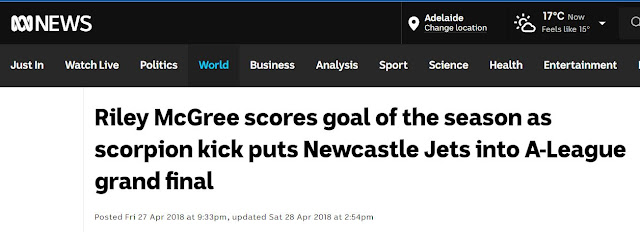Creative actions in team sports
I recall the interview with Ernie Merrick after the game where Riley McGree used the scorpion kick to get the goal, and he said the Riley had been practicing that kick at training for weeks. This reminded me of an interview I once heard with Peter Daikos, decribed often as a 'freakish' Collingwood AFL goal kicking star of the 1980s and early 1990s, where he discussed that his talent came from hard work, preparation and practice - his 'freakishness' was a practiced ability. Similarly, teammates of more recent 'freakish' AFL goal kicking star reveal his in-game actions to be the result of hard work, preparation and practice.
Are these in-game actions creative or retrieval of a motor-ability in the moment. Memmert (2015) defined creativity in team sports as a players sport-specific divergent thinking. Generally, divergent thinking is considered a cognitive activity. Therefore, is a creative action the player selection of a novel (as in, not the usual) movement solution to the moment possible because they have learnt that action: that is, it is part of their functional ability?
It has been repeatedly shown that sport-specific divergent thinking is associated with tactical creativity (Memmert, 2015) and accompanied by a wide breadth of attention at any one moment of time in the game. From the conceptual perspective that creative actions are a function of a players capacity for sport-specific divergent thinking, it is inferred that it is possible to train a players ability for creative in-game actions by developing a players ability to transfer divergent thinking to in-game actions. The mechanism of transfer seems to be enhancing the player repertoire of movement skills.
Recent work by Zahno & Hossner (2022) suggests that aiming to train player creativity by working on divergent thinking ability as a cognitive activity seperated from the context of application 'misses the point'. The focus should be on increasing a players task relevant skills which give the player a movement repetoire to call on to perform creative solutions as necessary for specific game situations. That is, the player has the functional motor ability to meet the 'needs of the moment'.
As a psychomotor activity, creative in-game movment solutions might be considered a developed ability of the player. From recently reading in this area, the pedagogogical-instructional perpsective I gain is that player creativity is developed by situational skill training.
Thanks for stopping by and reading this post. If you would like to connect with me on a project to do with creative actions in team sports or an of the other ideas I have posted on, you can contact me by the email link available here




Comments
Post a Comment